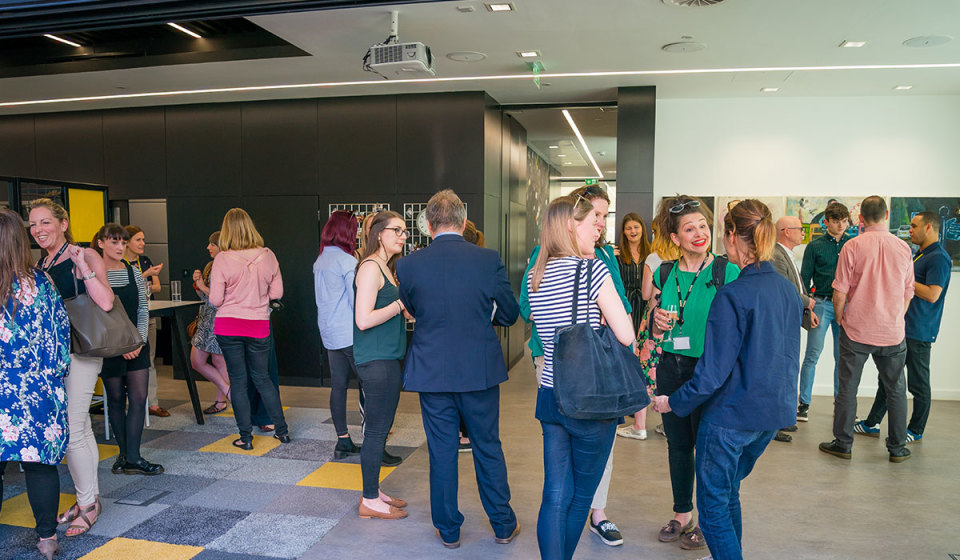‘It’s important to feel connected’: companies share their co-working experiences
By Bruntwood Works

Achieving a true work-life balance is notoriously difficult, whether you’re a working parent, first-time entrepreneur or a senior business leader. Here, four customers at Bruntwood’s Neo building in Manchester explain their flexible approaches to working.
Richard Ferrar is head of marketing at artificial intelligence company Peak
I am of the belief that you should work hard and go home. That’s what enables you to recharge your batteries. Our office is designed so people can collaborate and talk to each other while working flexibly, but we encourage them to have their notifications turned off in the evenings. Most things can be sorted the next day. I switch off by playing music. One of our other members starts the morning with 30 minutes of meditation. Our people use their skills to improve their work-life balance too – one built an AI-powered tool to determine house price trends and bought his house accordingly. Another has worked out optimum travel times and accuracy.
We don’t have assigned desks – we have a large community area where we mix with different people from different companies and we think that really contributes to maximising productivity.
Antonio Giansante is co-founder and operations director of strategic design agency BGN
We set up this company with work-life balance in mind. We all have young families – I’ve got a six-month-old baby – and work-life balance to us means spending as much time as possible with them. We just don’t believe in working loads of hours for the sake of it. If you can’t do your work in 40 hours, then your business is not efficient. Eventually we’d love to implement a four-day week.
We try to trust that our people will do their work. I think breakfast is very important, so we make sure everyone has everything they want, from potato cakes to cinnamon and raisin bagels. We also go for “family meals” once a month. You spend a lot of time with people at work, especially in a small team, so it’s important to feel connected.
As long as you have the internet and a computer or your phone you don’t need much else. It’s remarkably easy for me to switch on and off from work. You know what? People can usually wait for a response.
Simon Ramsden is a director at engineering consultancy Hilson Moran
Electronics has changed how we work and I can sit for hours in an evening on my laptop. But in terms of how we run our office, we employ professionals and we’re paying them to do their job – not to sit in the same place for a set number of hours. Our staff work from home when they need to and our office computer system tells us if projects are on track. The days of finishing a meeting at 3.30pm and wasting time travelling into the office are over and we have to accept this.
My problem is that my work is also my hobby, so if I am sitting thinking I could watch television, I’d rather be sorting out work instead. But I am genuinely happiest when I am not switched off. We had a staff meeting yesterday and I asked everyone how we could be more efficient. One of our tips was to use spreadsheets instead of Word. Engineers sometimes want to write reams of technical jargon that nobody has time to read, that can be communicated more succinctly. I’m happy if staff go to the gym at 11am to avoid the lunchtime rush; it’s more efficient on their time. I’m actually out and about so much that it’s refreshing being back in the office. It helps that it’s a great place to work, designed and run as a WELL-accredited office. This has had a huge impact on staff satisfaction.
Peter Brown is CEO of Notch Communications
I run two very diverse companies, Notch Communications and a biotech company, Stream Bio, so I don’t sleep much. In fact, I sleep around four hours a night and have done for the past 30 years. I deal with a lot of major corporations in North America and being in the service industry you have to be around when they are working. I basically never go to bed on the same day I wake up, but constant trips across the pond mean I don’t get jetlag.
When we set up Notch we wanted to employ some of the brightest scientific minds out of university, and if you take me out of the Manchester office the average age is 23. We’re not a 9-5 business, so we have to allow people to have time out during the day.
I, personally, rarely stop working, but I love getting up in the morning. Even if I don’t always have time to go to the gym, I find a way to complete 10,000 steps in a day. I walk to the station in the morning and back in the evening and I leave the office for about 40 minutes to walk around the city, to ponder. You have to be mindful of stress levels when you’re in an industry like ours, so we encourage our staff to do as much as they can. In the next couple of months Neo is launching a wellbeing centre for people working in the building – in fact it’s a pretty remarkable place to be, with things such as mindfulness and yoga sessions.
Non-independent content produced as part of a commercial deal with Guardian Labs.
Stay Connected!
Sign up to our newsletter for the latest news, updates and offers.